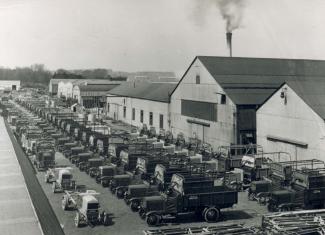
The Thornycroft name has been associated with shipbuilding, marine engineering and other activities for well over a century. However, there are many people living today who can remember when the Thornycroft company, despite its mainstream nautical activities, was once a notable manufacturer of commercial and military vehicles - a time when Thornycroft vehicles could be seen going about their daily duties as a matter of routine. Less well-known is Thornycroft's brief foray into car manufacturing, when, from 1903 to 1912, the firm produced high-quality cars at its Basingstoke factory.
The Thornycroft era started in 1862 when John I Thornycroft (later Sir John) designed a steam car. Two years later, he formed the Steam Carriage and Wagon Company, with works at Chiswick, London. However, the project was brought to a halt by over-zealous legislation for road vehicles, and John Thornycroft took up shipbuilding, also at Chiswick. Launched in 1871, Thornycroft's 60ft (18.3m) steam launch Miranda was notable for its high speed of 18kts (20.7mph (33.3kph)). The following year, John I Thornycroft & Co was set up and became known for its small, high-speed ships and launches. The firm recognised the potential of water-tube boilers, in comparison with traditional fire-tube boilers, and Thornycroft water tube boilers were first used in the Royal Navy in 1885.
While he pursued his shipbuilding interests, John Thornycroft took up road vehicles again and built his first steam vehicle at the Chiswick works in 1895. The Thornycroft Steam Wagon Company Ltd of Chiswick became a noted producer of steam lorries and vans, and high demand led to the setting up of a new factory at Basingstoke, Hampshire, in 1898. The following year, Thornycroft steam wagons were supplied to the Army for the first time. London's first powered bus was a Thornycroft steam double decker.
Thornycroft's shipbuilding works were transferred from Chiswick to Southampton in 1904, and the firm built on its success to become a world leader in the design and construction of ships. Continuing success with steam wagons gave Thornycroft a solid reputation for producing road-vehicles, and it was natural that the firm should turn its attention to producing vehicles with IC engines. The first Thornycroft motor vehicle was introduced in 1902, a commercial vehicle with a four-ton load capacity. The firm gave up building cars in 1912 to concentrate, for the next half century, on building its successful commercial vehicles - a field in which Thornycroft became world-class and and a major employer in Basingstoke.
The Hampshire Museums Service collection was formed in the late 1970s and is now the most comprehensive of its kind in the public domain. The collection includes vehicles, machine tools and equipment, production records and photographs, printed sales brochures and handbooks, family archives and general business records relating to both the vehicles and ship-building divisions.


